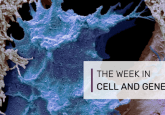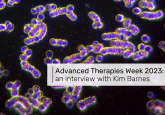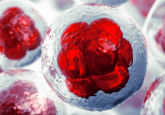Top 3 grants in regenerative medicine: September 2023

This month’s top grants in regenerative medicine, sourced from Dimensions, include projects on innovative biomaterials for improved tissue engineering, how matrix stiffness and viscoelasticity mediate proliferation and Enhancing stem cell therapy for cardiac regeneration.
Azide-clickable extracellular vesicles: innovative biomaterials for improved tissue engineering
This interdisciplinary project aims to develop and evaluate an innovative technology for incorporating extracellular vesicles (EVs) into biomaterials designed for tissue engineering and regenerative medicine applications. The primary focus will be on using a novel azide-based click chemistry method to securely attach MSC-derived EVs to silk fibroin, however, this immobilization technique can also be applied to other biomaterials. The hypothesis underlying this project is that “azide-clickable” MSC-derived EVs will exhibit more stable immobilization to silk fibroin biomaterials compared to unmodified EVs and this will result in higher regenerative potency. Proof-of-concept studies will demonstrate how this technology can improve the treatment of chronic wounds and enhance the performance of tissue-engineered vascular grafts.
Funding amount: US$734,507
Funding period: 1 September 2023 – 31 July 2028
Funder: National Institute of Biomedical Imaging and Bioengineering (NIBIB)
Research organization: University of Pittsburgh (PA, USA)
How matrix stiffness and viscoelasticity mediate proliferation
This work aims to reveal how the extracellular matrix and biomaterial properties impact cell proliferation in 3D. Changes in the matrix surrounding cells are known to impact cell behavior and proliferation, but the mechanisms mediating the impact of these changes remain unclear. This project proposes that mechanosensitive ion channels and integrins collaborate to sense changes in matrix viscoelasticity and stiffness and subsequently control cell proliferation by influencing chromatin availability, yes-associated protein-independent transcription, and novel molecular regulators.
This hypothesis will be tested with three aims, employing hydrogels with tunable viscoelasticity, stiffness, and ligand density for 3D cell culture. Aim 1 will uncover the biophysical mechanisms governing cell proliferation. Aim 2 will focus on the transcriptional and epigenetic regulation of mechanotransduction and proliferation, while Aim 3 will utilize CRISPR screening to identify new regulators.
Funding amount: US$386,000
Funding period: 1 September 2023 – 31 August 2027
Funder:National Institute of General Medical Sciences (NIGMS)
Research organization: Stanford University (CA, USA)
Enhancing stem cell therapy for cardiac regeneration
Following a myocardial infarction, or heart attack, a significant loss of cardiomyocytes can result in the deterioration of cardiac function. Since adult cardiac myocytes are unable to proliferate sufficiently to replace the damaged tissue, in many patients, this deterioration in heart function is irreversible and can lead to heart failure. Stem cell therapy offers hope by generating new heart tissue and blood vessels. However, one major challenge is the limited survival and retention of transplanted cells, which has been shown to be due, in part, to inflammation.
The goal of this project is to improve stem cell transplantation outcomes for end-stage heart failure by targeting genes involved in inflammation in the transplanted cells. Success in this project could lead to personalized cardiovascular care and the translation of transplantation therapies from research to clinical practice.
Funding amount: US$400,417
Funding period: 1 September 2023 – 31 August 2024
Funder: National Heart Lung and Blood Institute (NHLBI)
Research organization: University of California, Davis (CA, USA)





